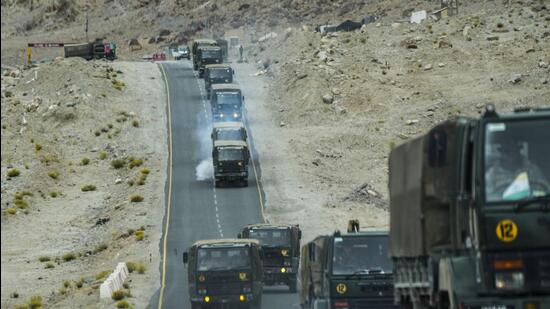No normalcy with China till border pacts are respected: Jaishankar
To a separate question on the convergence between India and the US on China, Jaishankar said that where Indian and American interests converge - “and they do” - was on the “stability, security, progress prosperity and development of the Indo-Pacific”
WASHINGTON: Even as China insists that the situation at the border is “overall stable”, external affairs minister S Jaishankar has said that his own stance - there can be no normalcy till border pacts are respected - remains the “accurate policy assessment” of the state of the relationship.

During a press conference at the end of his 11-day visit to the United States, HT referred to China’s statement on Tuesday (the Chinese ambassador to India had said that the emergency response post Galwan has given way to “normalised management and control”) and Beijing’s consistent messaging that things were fine, despite India’s position that there could be no normalcy till border pacts were respected.
When asked if something was getting lost in translation, and he wanted to send a stronger message, the minister, without getting into the specifics of China’s statement, said, “What I have said to my mind represents accurate policy assessment of where the state of our relations are. We continue to strive for a relationship with China, but one that is built on mutual sensitivity, mutual respect, and mutual interest.”
To a separate question on the convergence between India and the US on China, Jaishankar said that where Indian and American interests converge - “and they do” - was on the “stability, security, progress prosperity and development of the Indo-Pacific”.
Giving the example of the Ukraine war and its the turbulence it has created for people across the world, the minister said, “This is an extremely globalised, extremely interlocked, very interdependent world. To say we have skin in the game is an understatement - we have vital stakes in ensuring that the larger region is stable, it is secure, there is cooperation, and focus is on the right things.”
Commenting on the divergence between the Indian and Chinese positions, Harsh Pant of the Observer Research Foundation said that both sides have their incentives to continue on the policy trajectory they have set out for themselves.
“The Chinese are under pressure on multiple fronts and would want to see some kind of normalisation with India. So we have seen some choreography on the border, some positions where they have ostensibly disengaged to pre-April 2020 positions. They seem to want to send a larger message that China has taken adequate steps to disentangle some of the knots that were tied post the Galwan crisis and want to put the onus of the conflict back on India.”
But from India’s perspective, Pant said, New Delhi believes it has some momentum on its side. “India feels it has stood up to China. It has stood up in a way few expected it could. It has put China, in some ways, on the backfoot on the boundary question and larger ties. Therefore, there is no incentive for India to actually slow down that momentum.” Delhi feels its policy approach is yielding dividends, and India will continue to push.
China has an incentive “to make it seem” that it has taken steps to normalise things; India has all the incentives to continue with its policy to ensure that China takes Indian concerns seriously. “That’s why the messages are distinct. I don’t think anything is being lost in translation. Both sides are being deliberate in their messaging to achieve their respective diplomatic objectives.”
Explaining the key driver of the India-US engagement, Jaishankar said that what had happened in recent years was an India “whose interest and inclination extends sufficiently eastwards into the Pacific” and a US “open enough to work flexibly and comfortably with partners going beyond the orthodox limitations in the past of treaties and alliances”. This, he seemed to suggest, was the key enabler of greater convergence.
“The world has changed. No single country by itself can shoulder the responsibility and burdens of international peace and common good. It requires a collective effort. India and the US is one part of it; we have a bigger coordination in terms of Quad. If you look at two initiatives - the Indo Pacific Economic Framework and Indo-Pacific initiative for maritime domain awareness - they extend beyond, they are open, have multiple players,” Jaishankar said.
It is a globalised world, and there is a realisation among countries that the world isn’t unipolar or bipolar but has multiple players with common interests who needed to work together, he added. “The rest of the region looks at the more capable countries to pull their weight and work together. I believe in defining international affairs in positive terms…and would urge you to think of it as the betterment and strengthening of Indo-Pacific as shared objective between us.”
On the sidelines of the United Nations General Assembly in New York, Jaishankar also participated in the India-France-Australia trilateral, another institutional mechanism in the Indo-Pacific. When asked about it, given the acrimony between France and Australia after the AUKUS deal last year, and whether India had a role in bringing the two together, the minister acknowledged there were “some issues” between the two countries last year, which is why the trilateral couldn’t take place.
“They seem to have put that period behind them. That’s for them to do. I would not pretend to you we were involved. But we are very glad that two important partners for us have reaffirmed their ability to work together and work with us; that’s to our advantage,“ he said.
Get Current Updates on India News, Lok Sabha election 2024 live, Election 2024 along with Latest News and Top Headlines from India and around the world.




